#Fantasy Setting
Explore tagged Tumblr posts
Text


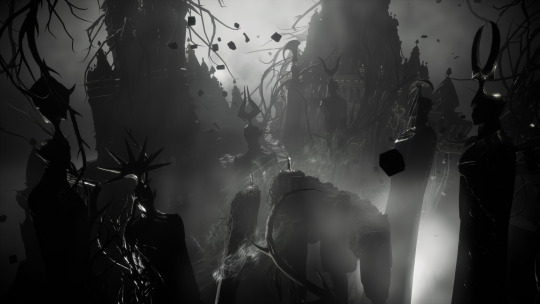
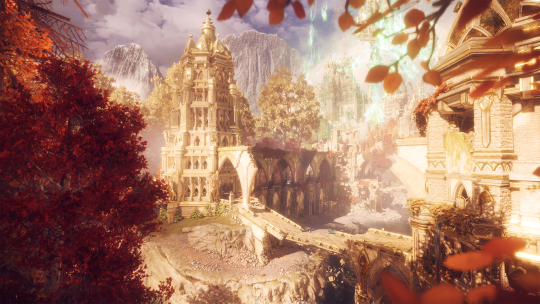
Just because you're at work doesn't mean you have to leave Thedas ✨ Here are a few backgrounds for your next video call!
1K notes
·
View notes
Text
Futuristic Settings and the Erasure of Disabilities
The common theme in a lot of futuristic, sci-fi or not, settings, is the abundance of cure tropes that are thrown in there. Disabled people either don't exist, or aren't actually disabled - they get a magical device that undoes their injury, or get a mech suit that basically does the same thing.
Often the setting is treated like an excuse that can't be rebutted in any way: “but my story is set in the future where medicine is better!”
So: is that true? Does better medicine actually mean less disabled people?
Historical Accuracy
[large text: Historical Accuracy]
In 1900, the life expectancy of a person born with Down syndrome was 9 years. Try putting yourself there and imagining that 2024 is the Future - better medicine, basically sci-fi in comparison to what they had back there. In that future, what is true?
a) There's no people with Down syndrome.
b) People with Down syndrome live to be 60 years old on average.
Answer: B. The only countries with fewer people with Down syndromes are the ones engaging in widespread eugenics, which is a topic I will not be getting into in this post, but I'm mentioning because the only places without disabled people are eugenicist.
The “better medicine” of the future didn't make Down syndrome curable, it made people with it survive longer. 50% of people born with it today will live to be over 60 years old. In the future, there will be retirees with Down syndrome. In the past, 50% of them wouldn't have made it into their teens.
Why does that matter?
[large text: Why does that matter?]
Future medicine won't make disabilities disappear. It will make them more manageable. Less deadly. Easier to survive.
If you base your knowledge and perception of disability throughout the times on sci-fi novels by able-bodied writers, you're going to hate how it actually works in real life.
Have we magically- technologically gotten rid of diabetes? No, 11% of Americans have it. 103 years ago, diabetes were lethal. There aren't fewer diabetics compared to the past. They live longer. You probably know or heard of someone who has diabetes.
You need to expand your understanding on how disability and medicine work, because “future = no disability” is genuine nonsense. It doesn't work like that, and it really frustrates me how writers dead-set on “logic” in their setting fail to see this.
Are paralyzed people walking around in various mechs, or are they using better wheelchairs than those from 100 years ago? Wheelchairs that make it easier to be independent? That help with symptoms of their disabilities by preventing pressure sores, or providing alternative methods of maneuvering?
In the future, why would there suddenly be those futuristic transplant* spines instead of wheelchairs that can be used with one's brain or eyes, for those who can't move their hands, mouth, or head? Why wouldn't there be wheelbeds for those who are currently bed-bound because they can't manage being upright in any way?
*Also, how are all of these magic disability-fixing transplants never actual transplants? Receiving a transplant basically always ends up in being immunocompromised because of the very way the body works. If you're writing about humans, this isn't going to change.
Things like sign language or wheelchairs have been used for thousands of years, they're not going away anytime soon or not-so-soon.
Future = More Disabled People?
[large text: Future = More Disabled People?]
We already discussed that there are presently common disabilities that used to be lethal a century ago or even less. If we use this fact for a futuristic setting, you suddenly have a myriad of new possibilities.
There's vastly better medicine? A lot of people deal with post-rabies syndrome because it's finally survivable, but it leaves people with the effects of the meningitis that rabies cause. There's way more quadriplegic people because the survival rates are much higher. Cancer survivors are more common because people live longer. Physical therapy for people who had prion diseases because they aren't fatal anymore but cause severe disability. Head trauma is more treatable, so there's more people with TBIs and fewer people dying in vehicular accidents.
The technology is super advanced? People with locked-in syndrome can operate an AAC device with their eyes, fully customize its voice to their liking, and not have to worry about battery life of their powerchair because it has sonar panels. Canes that can fold themselves with the click of a button so that they can fit in one's pocket.
There could be so many more adapted sports. Tools and technology that can adapt a house exactly to one's needs. Wheelchairs that are actually affordable. A portable pocket sized device that makes ableds behave normally around disabled people.
The point of this post isn't to completely shit on sci-fi settings, but instead to urge abled writers to think a bit more and try to be creative in the way they go about speculative fiction. Write. Something. New. There's one billion stories about how impossible it is for disabled people to exist in the future, and it's upsetting at best to read that constantly when you're disabled. As long as there are people, there will be disabled people.
mod Sasza
889 notes
·
View notes
Text






In the future Episode 2 of @forevergoldgame, the Convoy is actually going to actually get on the road and start traveling. That means characters depicted on horseback. That means an opportunity to overthink and overdevelop some "horses."
Usually I'd just hand some colored napkin scribbles to Dan but it sounded fun to clean it up a little bit more so that's what I did.
(I also played with designing some riding tack, but realistically the tack depicted here is probably not going to be something we want to have to recreate across insert illustrations, so take those designs with a grain of salt. Also, ignore all the missing straps and details that should be there but aren't.)
Also, as a side note... man it's NIGH IMPOSSIBLE to recreate a dapple gray coat in a simple cartoon cel style, holy shit.
#forevergoldgame#verse: forever gold#fantasy setting#worldbuilding#fantasy animal#elk#hare#it doesn't say so but Paladin and Aubergine are the same boreal south breed#horse#oc: kaitos#oc: vicky#oc: elijah#oc: itaja#oc: cathy#oc: lamonte
172 notes
·
View notes
Text
Imagine a Butterfly Alien
Imagine...
you're a human whose been farming and growing plants for as long as you could walk. You like the birds, the bees, the butterflies, even all the bugs that others thought were gross and useless...worthless, yet you've found appreciation of them.
you're also not ignorant to the fact that aliens have made their presence and cultures known to your world for a little while now. You've yet to meet any in your tiny farming village, but you're sure they can't be too different from any other humanoids you've met before. To say you're a black sheep to your village in those statements would be a massive understatement.
That's not to say you're surrounded by bigoted, closeminded individuals- on the contrary, your little village is eager anticipating meeting these new friends no matter what variety they are. So excited and willing to accommodate.
So, you're more than a little surprised when one day you hear a loud crash on your farm and go running over to investigate only to see a massive Butterfly Alien having torn his wing and crash landed your on your front lawn. Right near your butterfly bush, you reflect later. In the moment, you're sheepish to admit, you're spending the time panicking and crying.
At first, the Butterfly Alien is dazed and equally confused, interesting distended eyes seemingly peering around. You're sat next to him, face flushed and teary eyes, voice high pitched and fast paced; he's in pain and immediately notices tear within the upper quarter of his right wing. You can only assume he starts to suffer shock as he begins to violently tremble. At this point, you're more than upset at yourself for not going to at least one Culture seminar your village held to ease the welcome and culture shock of/for your future visitors.
You're frantic and nearly as trembly as the Butterfly Man you attempt to touch Him, but you flutter your hands around (adorably) unsure if you'd stress or hurt Him further. Tears finally begin to fall as the anxiety of it crests- the Alien flutters His wings quickly, almost desperately, as if gauging them, testing their abilities. You gasp loudly as the tear rips the top quarter of His wing off right in front of your eyes. You begin to hyperventilate as the Man begins to tremor again, whole body shaking like a leaf caught in the wind.
You can't quite see what happens next, eyes blurring your vision with thick tears causing you to wipe at them with the back of your hand. It's as you're doing that when the Butterfly Man moves. It's quicker than you imagine He could move before He's up; and one second later He's flying again.
He doesn't even appear to turn back as he glides up into the sky, as if He'd never crashed at all. You're left there blubbering, blurring vision flicking between the sky and the dinner plate sized wing remnant left in your yard.
You can't understand why, but when the breeze starts to pick up, you snatch the piece of his wing with your shaky hands and hurry inside feeling as if you'd seen a ghost. Unsure where to go with it or what to do with it, you find the biggest frame that you had that could fit it and frame it. It's the only way you can think of no harm coming to it further. It's beautiful, too, soft but vibrant colors popping against the whites of your wall as you hold it up in the sun.
You look into attending some of your village's culture seminars a few hours later after your heart stopped racing and mind spinning with everything that had happened.
Imagine as you're walking into town to see when the next Culture seminar is and you're hearing from whispered shadows as you're walking into town "did you see?" "did you hear?!" "They finally came!" "We need to throw a Welcome Festival!" "I wanna make them food to welcome them!" "I-I heard they're all...single..."
You fluster again when you reach the center of your village square, there's several insectoid aliens that have migrated to your village- drawn by its rich agriculture and farming lifestyles. There's only one Butterfly Alien, though, it's here, and only here, finally here that you get a good look at the person who literally crashed into you life.
He's not just beautiful, all colorful wings and lean muscles and graceful movements, He's handsome, too. He's got these masculine humanoid traits that add a rugged edge to His beauty- He's got a distinct jawline and defined cheekbones and whilst nothing about Him is particularly sharp or overtly (humanly) masculine, there's a defined demeanor to Him that pulls in favor of His handsomeness. The tear in His wing helps strongly to add that ruggedness.
It's hard to tell with eyes like his if you've met his gaze but with his posture shift and almost sheepish expression coming over him you feel as if you may have. You flush, flustered by his attention even so indirectly. The head of your village, MeeMaw, eagerly invites the couple of them into her space and once they're out of sight the whispers turn to full on chatter.
You huff, trying to push past how out of whack everything's become in one day and now you suppose you have a dual purpose for lingering by MeeMaw's quarters. You'll definitely need those Culture Seminars after today, and you suppose while you're at it....You could try and give the Butterfly Man His wing back to Him....You don't know if He needs it, but at the very least you'd have an excuse to talk to Him. You just hope you don't get shy on Him...you certainly didn't make the "best" first impression
(Little do you know, He thought it was so cute. So panicked over Him without knowing Him. So worried over Him without knowing He'd been there to peep on you after seeing just how cute you were tending to your farm
(Imagine He's just so grateful and thinks you're the cutest, sweetest little thing to save His wing for Him. Were you going to go looking for Him like some sweet and brave Knight in shining armor? How adorable!
(So sweet, little human, so cute! Gosh, you must be His! You must be made for Him! Why else would you have been so scared for him? You wouldn't save just anyone's amputated limb, would you? You must...love Him!
(You have no idea, either, until much later anyway, just how rare He is. Insectoid Aliens aren't the most intergalactically social so they're pretty rare off their own planets- Butterfly Aliens especially so, even more so. Mostly due to the fragility of their wings and inability to regrow. If someone wanted, it would be so easy to destroy or even rip His wings from Him, yet you wept over Him. Many would steal Him away, cage Him forever; yet you let Him free. Let Him keep His freedom. You're truly one of a kind. Just as He is.
(That must mean He's right- you are made for each other. He's glad you think He's handsome, He'd fight you for your love even if you were to think He isn't.
#yandere oc#yandere#butterfly alien#alien oc#butterfly alien oc#fantasy setting#human x alien#yandere x reader#alien x reader#original character#original post#insectoid#monster lover#teratophillia#terato#monsterfucker
582 notes
·
View notes
Text
fair warning this is clunky;
wasn’t originally a fandom piece but imagining john price as a gruff older knight, who thought he would finallyyyy get to retire after many years of working his ass off for an old king. getting promoted to a lord in title alone, some land, a reward for his outstanding service.
and then getting dragged back into service because some duke couldn’t keep his mouth shut and his daughter got kidnapped because of it. john is an incredible tracker, so he’s forced recruited for the job.
oh he finds you, of course he does, after three fucking weeks and hiking half the continent and you know what? he doesn’t think gold is enough of a payment for this. he thinks he wants a nice wife to keep him company. he thinks he wants a big, fuck off royal wedding to this little lady everyone thinks is so important. let’s see them try and deny him that.
and when he finds you? it’s so easy to convince you to let your knight in shining armor blow off some steam, to let him press his body into yours. and when you’re blushing and softly saying that it’s meant to stay pure for your husband, well, john tells you that you don’t have to worry. that he’s been gifted your hand and you’re basically already married so why don’t you just let him in now, dove, hm?
after all, when your father finds out john’s ‘stolen’ his daughter’s precious maidenhood, you’re guaranteed to be his. and there are much worse marriage candidates than a captain turned lord.
#john price#call of duty#john price x reader#john price call of duty#writing#sorry this is so shit i’ll add more#i just wanted to get it out it was eating away in my head#kinda dark john lowkey?#dark john price#manipulation#fantasy setting#fantasy#knight john price#lord john price
116 notes
·
View notes
Text
The Taste of the World: Writing Food as Storytelling

Food is never just food. It’s culture, history, survival, and, perhaps most importantly, a language that characters and worlds use to speak when words fail. The way food is grown, prepared, and consumed reveals the structure of a society—its priorities, its fears, and its memory. And in storytelling, the smallest detail about what’s eaten or how it’s shared can carry a world’s worth of meaning.
When used well, food becomes a subtle but powerful tool. It can reflect emotional tension without anyone saying a word, or quietly thread deeper themes through the narrative. It doesn’t have to overwhelm your story with excess description; it works best when it’s an organic part of the world, shaped by the same forces that drive everything else.
Let’s break down how to think about food as more than a detail, crafting it as an integral part of the characters, the setting, and the stakes.

Why Food is Fundamental to Worldbuilding
Culture and Identity
Food defines a culture as much as its language or traditions. The ingredients people rely on are determined by the land they inhabit, the technology they have access to, and the values they hold. It’s not just about what is eaten, but how—and why.
Think About:
What ingredients are unique to this region, and how did they come to rely on them?
How is food served—shared communally or divided by status?
Are there specific rituals tied to preparing or consuming meals?
These questions help frame food not as a decorative detail, but as a way to demonstrate how a culture lives and interacts with its environment.
Food as Survival
Food exists on a spectrum from abundance to scarcity, and its availability often tells the story of who holds power and who doesn’t. This doesn’t need to be stated outright—simple contrasts in what’s on the table (or missing from it) can highlight social divides or tensions.
Consider:
What foods are considered everyday staples, and what are reserved for moments of celebration or mourning?
How do people preserve food in harsh climates or through difficult seasons?
What compromises are made when survival is at stake?
Survival shapes cuisine, and cuisine, in turn, shapes the people. Food that may seem unremarkable to outsiders can carry in-depth meaning for those who rely on it to live.
Food as Memory
Meals are tied to memory in ways that few other experiences can match. They evoke places, people, and moments that might otherwise be forgotten. For characters, food can serve as a reminder of what was lost or what still needs to be protected.
Ask Yourself:
What does this food remind your characters of?
How does this memory shape their present choices?
What foods do they miss, and why can’t they have them anymore?
The emotional weight of food often lies in its connection to something larger—home, family, or an ideal that has slipped unreachable.

Integrating Food Into Your Narrative
The Subtle Art of Symbolism
Food works best as a storytelling element when it doesn’t announce itself. It’s not about drawing attention to the dish for its own sake but letting it naturally reinforce the scene or the character’s state of mind.
Example in Practice: A meal served quickly, with little conversation, could underscore a sense of unease or urgency. Meanwhile, the deliberate preparation of a dish might reflect care, control, or tradition.
It’s less about describing what’s on the plate and more about how the act of eating—or not eating—interacts with the story.
Building Tension Through Meals
Sharing food is inherently social, and like any social act, it can carry undercurrents of conflict or connection. Meals can be settings for negotiation, subtle power plays, or suppressed resentments. What’s not said during a meal can matter more than what’s served.
Think About:
Who prepares the food, and what does that say about their role or status?
What’s the mood at the table? Is the act of eating itself a kind of performance?
Are there unspoken rules about who eats first, how much they take, or what they avoid?
Food as tension is about the surrounding interaction, not the food itself.
Grounding the World in Small Details
Food is a powerful tool for grounding your world in a sense of place. By focusing on how ingredients are sourced, prepared, or consumed, you create an ecosystem that feels real without needing an info dump. A brief reference to a seasonal delicacy or the preparation of a daily staple can communicate volumes about the setting.
Use Sparingly: The best world building happens in glimpses. A short mention of pickling methods during a harsh winter or the fragrance of a common herb can paint a vivid picture without dragging the narrative down.

Applying Food to Character Development
What Food Says About Relationships
Meals are a social construct as much as they are a necessity. Who characters eat with, what they share, and how they interact during a meal reveal their connections—or lack thereof.
Consider:
Do your characters share food equally, or does one person dominate the meal?
Is a meal an act of kindness, a manipulation, or an obligation?
How does the way they eat reflect their personality?
Preferences, Habits, and Rituals
The foods a character gravitates toward can say as much about them as how they speak or dress. Perhaps a soldier instinctively chooses ration-style meals even in peacetime, or a merchant avoids exotic imports as a quiet protest against their origins.
Ask Yourself:
Does your character have a ritual or habit when it comes to food?
How do they react to unfamiliar dishes?
What’s their relationship with food—joy, necessity, or something else?

The Absence of Food
Every so often, what’s missing can be more telling than what’s present. A lack of food could signify poverty, oppression, or desperation. Even in abundance, what isn’t served can carry weight—certain foods might be taboo, seasonal, or too painful to prepare because of their associations.
The absence of food doesn’t need to be highlighted directly. Instead, its weight can be felt through the absence of conversation, the careful rationing of resources, or the visible strain it places on characters.

Final Thoughts: Food as a Storytelling Tool
Food is one of the most powerful yet understated tools in your storytelling arsenal. It connects your world to its people and its people to each other, revealing layers of culture, memory, and emotion without needing to over-explain.
When used thoughtfully, food doesn’t just flavor your story—it deepens it, grounding your world in something tangible and human. Instead of asking, What do my characters eat? ask, Why does it matter? Because when food becomes more than sustenance, it transforms into something far greater—a story in itself.

TAGLIST - dm or reply to be added 🫶🏾
@slenders1ckn3ss @lucistarsfire @fond-illusion @p00lverinecentral
#fantasy worldbuilding#writers on tumblr#writeblr#writer community#writerscommunity#queer writers#creative writers#writerblr#writerscorner#fantasy writer#fantasy writing#creative writing#writers#worldbuilding food#fantasy world#fantasy setting#fantasy#worldbuilding#world building tips#writer#aspiring writer#just writer things#being a writer#beginner writer#tumblr writers#writer life#writer on tumblr#writer problems#writer stuff#writer things
390 notes
·
View notes
Text
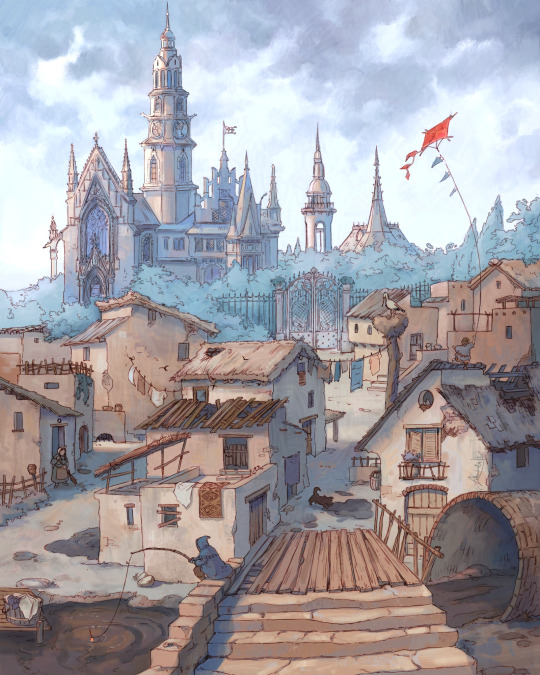
Love when I get to paint such detailed landscape scenes! This one is for the client's original story, showing the contrast between slums and rich neighbourhoods in a magical setting.
#my art#art commission#landscape#digital art#illustration#fantasy#fantasy setting#украрт#український tumblr
127 notes
·
View notes
Text
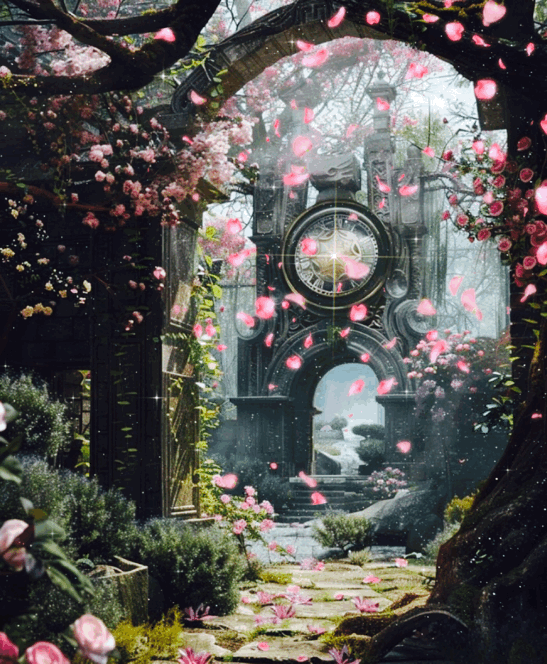
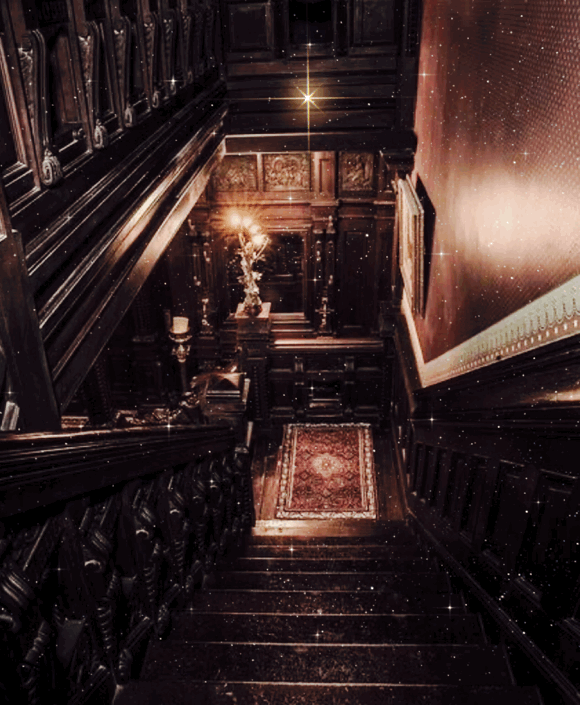


🌸🌷Roses Fantasy🌷🌸
#gifs(edits) made by me :)#assassin1513#mystical#mystic#fairy#fantasy#fantasy core#fantasycore#fantasy aesthetic#fantasy vibes#fantasy adventure#fantasy elements#fairycore#fairy aesthetic#fairy vibes#fairy cottage#fairy core#fairy coquette#roses#rose#magical#magic#leaves#fantasy landscape#fantasy life#fantasy lover#fantasy setting#infinity#grunge#castle
153 notes
·
View notes
Text
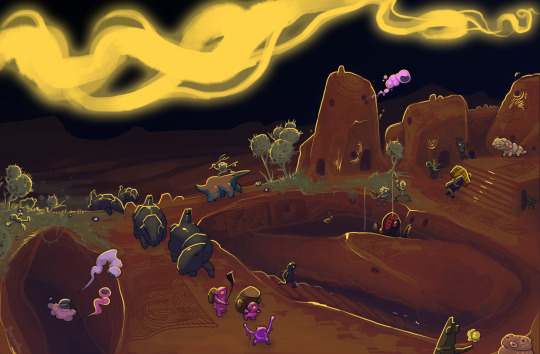
Ispod village
Ispod is an old worldbuilding project of mine about a wacky dimension of elemental critters, places either cozy or inhospitable and adventures. There is no day or night. And the dark world is lit by aurora borealis-like light events in the sky.
#bornulhu art#original creature#character design#ispod#ispod dimension#worldbuilding#fantasy setting
56 notes
·
View notes
Note
How would I handle writing this like missing limbs, wheelchair users, conjoined twins, serious burns, and hearing issues in a fictional/ medieval-fantasy setting were surgeries, prosthetics and other modern technologies are not available? I want my stories to have a lot of disabled and disfigured characters while also not falling into harmful tropes and stereotypes(motivations being solely about being disabled or the villain is evil because their disfigured etc.) but I’m not sure what my limits are when it comes to a specific time period we’re technology is extremely limited.
Hi asker,
In advance: this is a very long post.
The thing about disabilities is that they exist whether you have the technology for them or not. And the thing about surgeries and prosthetics is that they are very, very, very old.
Pretty much all the information in this ask is from Wikipedia, by the way. When it's not, I'll give you a link.
The oldest known amputation is 31,000 years old, and the next oldest known one is 7,000 years ago. 7,000 years ago is like 6000 BC, well before the medieval era, even if we're using medieval to mean the very very start of it in 500 CE. 6000 BC is, well, 6500 years before 500 CE. People were doing surgeries in Ancient Greece and Ancient India and Ancient Egypt and Ancient China. Were they less successful, on average, than modern surgeries? Yeah, definitely, considering infection risks and germ theory if nothing else at all. But surgery existed, and "surgeon" was an established title and job by the medieval era. A lot of technology is older than you think.
And in the same way, people with serious burns, missing limbs, and hearing loss have existed for a very long time.
I'll start with hearing loss because its inclusion in this ask surprised me the most. This doesn't affect someone's lifespan, and it doesn't require any technology to live with. Sign languages develop wherever deaf people are, because people want and need to communicate with each other, and if not that then things like pen and paper or drawing symbols. Some people today with different degrees of hearing loss & deafness exist without ever putting on a hearing aid or cochlear implant.
As to conjoined twins, they are very rare. Half are stillborn, a third of non-stillborn twins die shortly after birth. They have better survival rates today than in the past. And even then, there are reports of conjoined twins who are either older children or even adults, for a very long time. Here is a link to a paper called "The 3,000-year history of conjoined twins."
Chang and Eng Bunker (1811-1874) would likely have been successfully separated today, but they existed as conjoined twins in their time died at age 63. Earlier still, Lazarus and Joannes Baptista Collaredo (1617- at least 1646) were a case of conjoined heterophagus twins; Joannes Baptista was a parasitic twin and much smaller than Lazarus, and reportedly could not speak or move his body parts independently. But they still both lived until at least age 29. Older still, the oldest mention we have I think, Augustine of Hippo in 415 CE mentions what was likely conjoined twins. So they can exist.
When it comes to missing limbs, they don't have to affect lifespan. They can, but they don't have to. Missing limbs can be congenital, and congenital amputees don't necessarily need a prosthetic. Today, most upper limb amputees, congenital or not, straight up don't use a prosthetic. And limb differences exist regardless of if prosthetics do.
Even then, prosthetics are very, very old. The first one that we know of for a limb is around 1000 BC in Ancient Egypt. Pliny the Elder, born in 23 or 24 CE, talks about a prosthetic hand. The Capua Leg is from around 300 BC, and for a time was the oldest known limb prosthetic. For a non-directly-real example, how many pirates in movies have you seen with peg legs and hook hands? That's because people using both of those things have existed for a long time. François Le Clerc (died in 1563) was a privateer who had a peg leg. François de la Noue (1531-1591) was a captain who had his arm amputated and then had an arm prosthetic with a hook. (Big century for guys named François and prosthetics I guess lol.) Götz von Berlichingen (1480-1562) had two different prosthetics for the hand he got traumatically amputated.
Which goes into the point: survivable amputations are very old. Some are like von Berlichingen, and are lost in an accident, which the person survives. But some are surgical, like de La Noue above; his arm was injured by bullets and amputated later. Celsus described one as far back as in the 1st century. I mean, I'm sure they were miserable, what with no anesthesia, but they existed, and people lived. (Maybe your fantasy world has magical anesthesia?) Here is a paper called "On some paleopathological examples of amputation and the implications for healthcare in 13th-17th century Lithuania," which in the abstract alone mentions specifically that one skeleton showed signs of healing.
Wheelchairs are also very old, by the way. They aren't exactly like our wheelchairs today, but the first ones we know of are around 525 CE. Other things, wheelchair-adjacent but not quite, were used before that. I mean, as long as people who cannot walk have existed, they have needed to move to other places for whatever reason. Wheels getting involved is the easiest way to get that done.
Last but not least, burns. These are related to amputations, because a severe enough burn – 3rd degree or 4th degree – needs surgery as treatment so you don't die, and amputation is surgery. And, like mentioned above, surgeries, specifically amputations, have existed for a very long time.
If your world has magic, why can't this extend to burn care and amputation as well? I don't mean completely healing a 4th degree burn that goes right to the bone, especially because 4th degree burns just don't heal, there's not enough left, but perhaps magic helps prevent infection to nearby sites, or, again, works as painkiller when it comes to an amputation or promotes faster healing of the amputation itself.
But either way, if you survive a burn, even with significant functional impairment afterwards, then you are already alive, and you might make use of things we've mentioned above like prosthetics or wheelchairs.
Sure, if a technology isn't there then it isn't there. We don't have Leg Regrowing Technology, meaning some people who used to have legs and lost them don't still have legs. But that doesn't mean we don't have any way at all whatsoever to support said people, and the same can be said of any era.
Hope this helps,
mod sparrow
#historical setting#fantasy setting#historical reference#historical fiction#prosthetics#anonymous#wheelchairs#deaf character#limb differences#conjoined twins representation#burn survivor representation#mod sparrow#with thanks to mod sasza for help as well#amputee representation
194 notes
·
View notes
Text
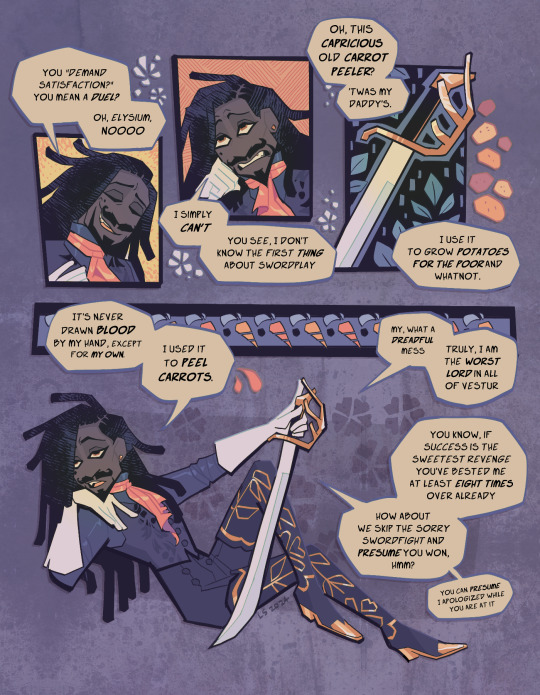
Perhaps you should just let this one slide. If you try to fight him, he'll probably just keep talking.
#oc: lamonte#verse: forever gold#original character#fantasy oc#fantasy setting#plant magic#magic weapon#comic#oc comic#forevergoldgame#art#artists on tumblr#dueling
353 notes
·
View notes
Text
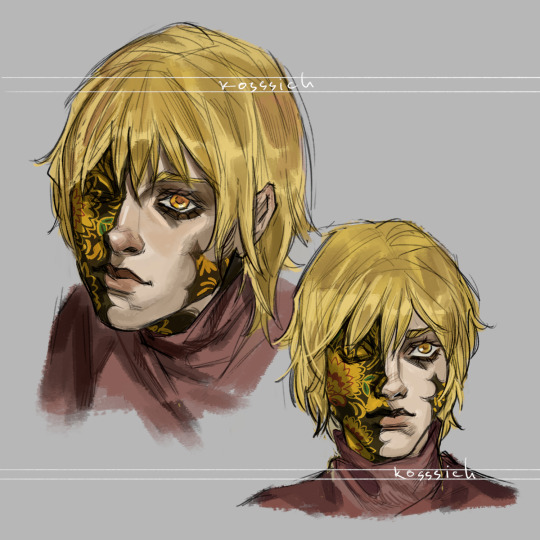
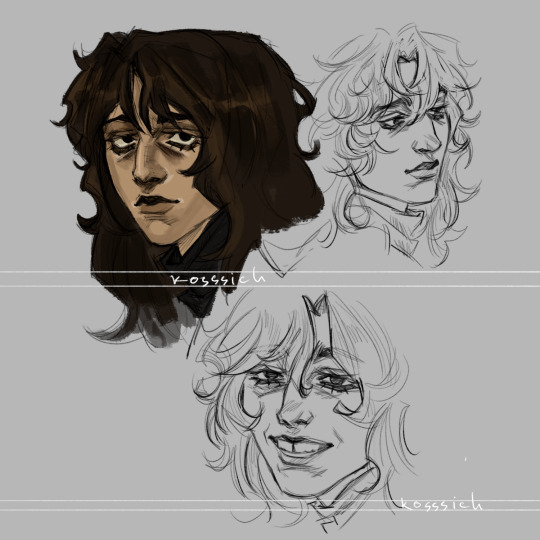
my ocs....,,,if u care....
25 notes
·
View notes
Text
The dragon/dragon hunter sheet is almost finished but in the meanwhile here is an old sketch:

A continental nobleman and his expensive and exotic bodyguards.
These bodyguards belong to the summerfolk species. (Although they go by many names such as wildmen or grass peepers).
They are very closely related to humans and my idea for them was: What if human evolution kept going? (Taller, more terrestrial and more efficient savannah pursuit predators)
They live in a vast warm grassland and were know by the peoples of the continent a long while ago but only semi-recently has considerable contact occurred.
They are as distant to humans as neanderthals were (kinda) and interbreeding can rarely occur although the offspring is mostly sterile.
These two ones in particular have traveled from their homeland to the continent and the right one is going to be a recurring character called Uluu.
In the continent they mainly work as travelling wrestlers and bodyguards. Their size makes them very intimidating, wich is an advantage but also a curse.
Uluu is not specially violent but his stature attracts lots of atention and just regularly ends up in fights.
Have you guys ever heard about that study that said that like 30% of men think they can defeat a lion in a fight? Thats kinda his problem. Many people want to prove themselves against him for self steem reasons.
The summerfolk are very athletic and have great vision. They are also melanistic humans so their skin, hair and even bones are pitch black.
Intelligence-wise they seem to be as complex as humans, but often suffer from claustrophobia and distress when surrounded by a lot of people, but its hard to tell if thats instinct or just that they are as individuals used to life in the plains.
They live longer than humans on average, although their risky lifestile often prevents them from doing so. They also reproduce slower and take a bit longer to reach sexual maturity (20 years perhaps?)
They require more meat in their diet, wich led to agriculture and full sedentarism not occurring naturally in them. (They would starve before the harvest).
Hope you like this concept and tell me what you think! Questions and ideas are always appreciated.
Here are some more sketches and WIPs abt these guys.





#fantasy worldbuilding#spec evo#worldbuilding#creature design#fantasy art#spec bio#art#concept art#fantasy#summerfolk#Uluu#sketches#fantasy races#fantasy setting#you guys should see how goofy they look riding a horse
53 notes
·
View notes
Text
How do you make your fantasy world feel lived-in?

Making a world feel lived-in requires more than just describing the landscape or architecture—it’s about creating the sense that the world has a history, a heartbeat, and its own rhythms of life. Here’s how I approach it:
Layered History: Every city, village, and ruin in my world has a past. I try to tie in subtle references to historical events, old conflicts, and forgotten legends that shape how people live today. By letting the remnants of the past—such as crumbling statues, faded murals, or cultural taboos—linger in the background, I create the impression that the world has been evolving long before the story begins.
Daily Life and Rituals: I focus on the small details of everyday life—what people eat, the music they listen to, how they celebrate and mourn. By showing the rhythm of daily activities, from bustling marketplaces to quiet moments in a temple, I give readers a glimpse into the culture and traditions of the world. These details make it feel like people are living their everyday lives outside the main plot, even if the protagonist isn’t there to see it.
Architecture and Geography: The physical layout of the world matters—how cities are built around rivers, mountains, or deserts, and how architecture reflects the culture and resources available. I like to create buildings and cities that tell stories themselves, with intricate designs, magical defenses, or decaying remnants of a once-glorious era. The way people interact with their environment adds depth to the world.
Senses: I try to engage all the senses when describing a setting—the smell of the sea, the taste of the air before a storm, the grit underfoot on a well-worn path. These sensory details make the world tangible, giving readers something they can feel, not just visualize.
The Mundane and the Magical: In a fantasy world, magic and the supernatural are often present, but I balance that by showing how the mundane aspects of life coexist with the extraordinary. Maybe magic is used casually, like enchanted brooms sweeping the streets, or it’s feared and tightly controlled. Either way, showing how the mystical fits into the everyday helps make the world feel more real.
Economy and Trade: Who trades with whom? What resources are valuable, and how do people get by in different regions? By grounding the world in economics—whether through thriving markets or resource scarcity—I give the setting a practical edge. These systems help define the way people interact, where power resides, and what drives the tensions in the world.
Flawed Systems: No world is perfect, and by including corrupt governments, failing infrastructures, or struggling populations, I show that this world isn’t static—it’s evolving, sometimes deteriorating. Conflict isn’t always about the grand battles; it’s also about the slow decay of a once-great city or the quiet resistance of a village against an oppressive regime.
By combining these elements, I make my worlds feel like places that exist beyond the plot—places with their own stories, lives, and rhythms that readers can immerse themselves in fully.
#writerscommunity#queer writers#writeblr#writer community#writerblr#writers on tumblr#writerscorner#creative writers#writers#writing advice#fantasy worldbuilding#fantasy world#free resources#novel writing#how to write#writing tips#fantasy setting#fantasy writer#fantasy writing
217 notes
·
View notes
Text
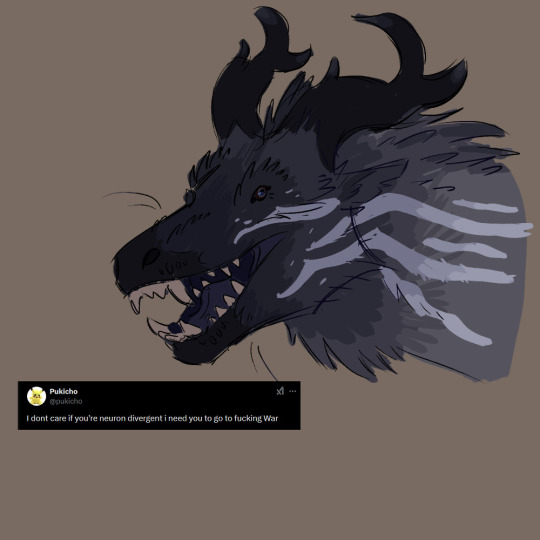
don’t remember posting this doodle of my dragon oc Steluun. he’s a character in my (very wip) fantasy setting. i don’t have much set in stone about him yet, besides for whatever reason he has the ability to reincarnate after death and when this was discovered he was taken and trained to be a soldier at a young age. i want to use him to write about emotional amnesia and disassociation
#my art#lupe yips#oc: steluun#oc#original character#fantasy setting#fantasy art#fantasy oc#dragon oc#dragon#dragon art
28 notes
·
View notes